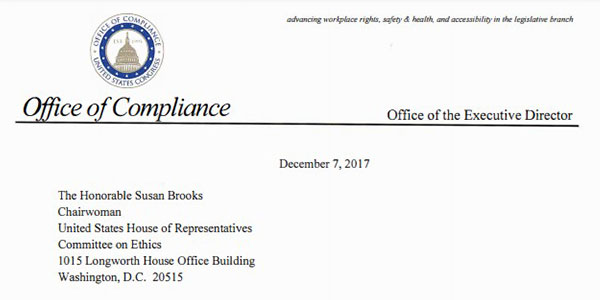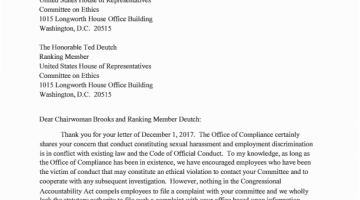Office of Compliance
December 7, 2017
Office of the Executive Director
The Honorable Susan Brooks
Chairwoman
United States House of Representatives
Committee on Ethics
1015 Longworth House Office Building
Washington, D.C. 20515
The Honorable Ted Deutch
Ranking Member
United States House of Representatives
Committee on Ethics
1015 Longworth House Office Building
Washington, D.C. 20515
Dear Chairwoman Brooks and Ranking Member Deutch:
Thank you for your letter of December 1, 2017. The Office of Compliance certainly shares your concern that conduct constituting sexual harassment and employment discrimination is in conflict with existing law and the Code of Official Conduct. To my knowledge, as long as the Office of Compliance has been in existence, we have encouraged employees who have been the victim of conduct that may constitute an ethical violation to contact your Committee and to cooperate with any subsequent investigation. However, nothing in the Congressional Accountability Act compels employees to file a complaint with your committee and we wholly lack the statutory authority to file such a complaint with your office based upon information revealed to us during a “strictly confidential” counseling or mediation session or a confidential administrative proceeding.
As you know, under existing law, all counseling and mediation conducted by the Office of Compliance is “strictly confidential” and all administrative proceedings and deliberations are “confidential.” See 2 U.S.C. §§ 1416(a), (b) & (c). The Congressional Accountability Act creates a very narrow exception to these statutory confidentiality requirements for your committee. That narrow exception grants me the discretion, after consulting with the individuals who have filed the complaints, to provide your committee with access to “the records of the hearing officers and the Board, including all written and oral testimony in the possession of the Office” but only after “a final decision has been entered under section 1405(g) or 1406(e).” See 2 U.S.C. § 1416(e).

